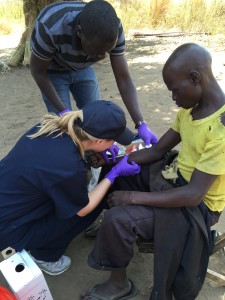Public health students begin new partnerships in Uganda
March 11, 2016 • Uncategorized
Scientists have long recognized the connection between diseases in animals and diseases in people.
Tuberculosis, brucellosis and African sleeping sickness, for example, are common infections passed from livestock to individuals in some third-world countries.
So when Katherine Fogelberg, DVM, PhD, with the UNTHSC School of Public Health announced a practice experience opportunity in Uganda to her students, best friends Conner Carlsen, Jordan Killion and Haylea Stuteville decided right away to apply. All three are MPH Epidemiology students planning to graduate in May.
Dr. Fogelberg, Assistant Professor of Environmental and Occupational Health Sciences and a veterinarian, was asked by the international Veterinarians Without Borders to join the University of Georgia, University of California-Davis and Makerere University-Uganda in a new partnership adding a first-time public health perspective to veterinary efforts of assistance.
“It was inspiring to work on the ‘people’ side of zoonotic disease issues,” Carlsen said. “This is where public health and veterinary medicine come together, because so many illnesses in cows, sheep, goats and other animals can be passed on to people, making testing, education and preventive efforts so critical in remote areas like those we visited.”
Imagine going house to house with a translator to inform communities about free testing available to families, then setting up outdoor lab stations in the middle of challenging conditions where wind, dust, temperature, insects and weather can all have an impact.
“We learned to be flexible; it was all about adapting to the environment and the local culture. Sometimes the heat reached 102 degrees. Sometimes the generator went out and we lost power to the microscopes and equipment. Sometimes we worked from the car. We were able to see firsthand what we had only read about or covered before in class,” Stuteville said.
“So many people wanted to be tested,” she said. “There were households where we walked in and found 30 to 40 people waiting, whether or not they were from the same family. It was complicated, because we needed accurate residence data in order to report the results back after the tests had been analyzed.”
The group also visited a local prison to test jailers involved with livestock through work release programs, as well as villages near the border of South Sudan, where a large refugee population resides.
Next steps following testing will include education, which often starts in the schools.
Students learn, teach their parents about prevention, and as Killion said, “can become the generation that makes change.”
For UNT Health Science Center, the journey has just begun, as two other public health professors and several students will be picking up where this group started, taking trips of their own over the spring and summer months.
That story is still to unfold and is hoped to be just the beginning of a longstanding working relationship with Veterinarians Without Borders.
After all of the experiences, the challenges, the 19-hour flight plus layovers, and another eight hours of drive time to reach some of these faraway Ugandan communities, would the students do it again?
In a heartbeat.
“It’s a chance to see how public health can have a great impact,” Killion said.
“The most rewarding aspect was to see how regardless of living conditions and how much or how little these people had, they were still so thankful and welcoming,” Stuteville said. “It meant a lot to be able to help make a difference.”


Social media